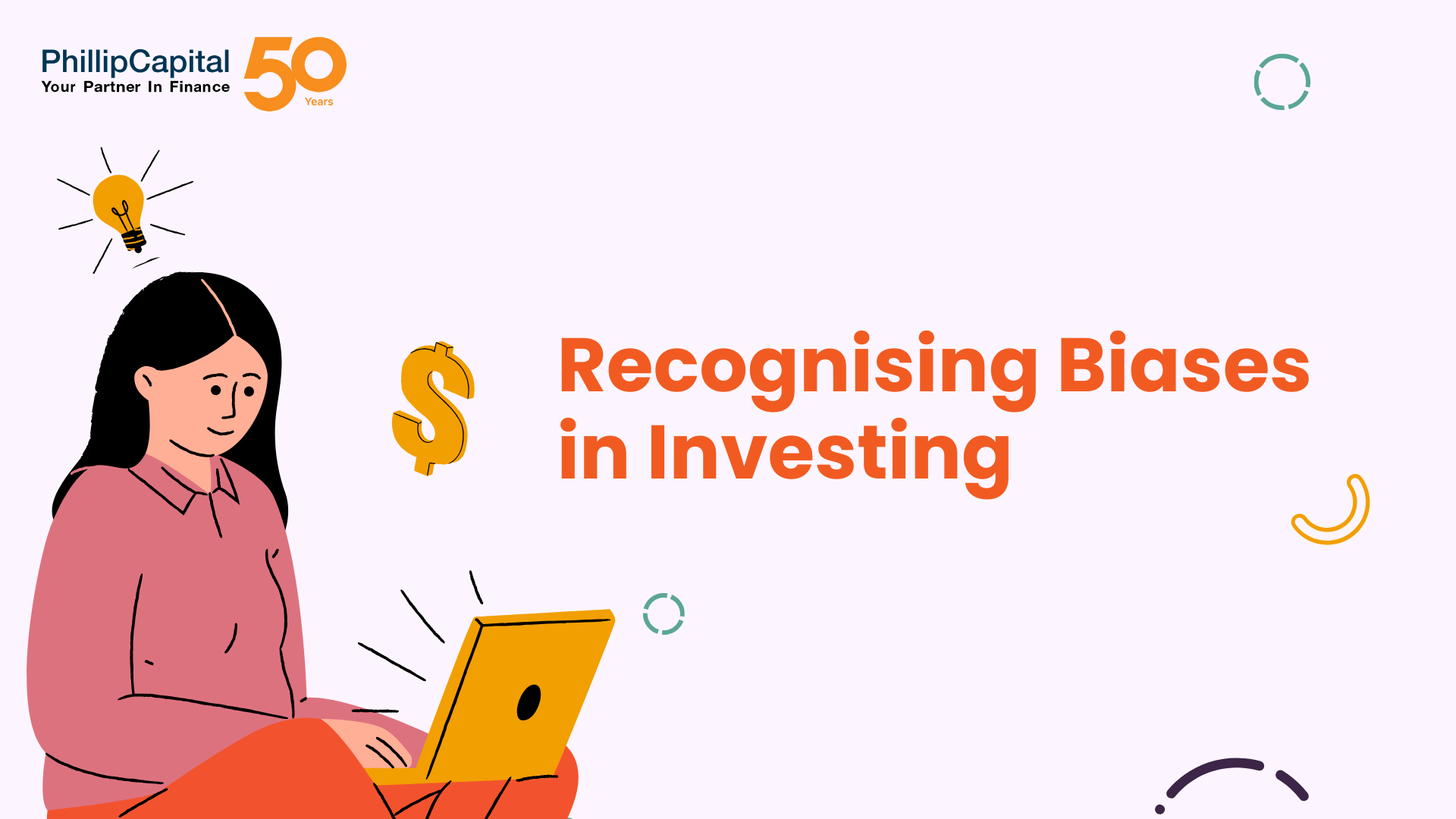Recognising Biases in Investing and Tips to Avoid Them September 4, 2025

Common biases like overconfidence, herd mentality, and loss aversion influence both risk assessment and decision-making. Know the emotional and behavioral biases in investing.
In investing, the biggest challenge is often not the market but our own minds. Emotions, habits, and common mental shortcuts can quietly steer decisions in the wrong direction.
A Charles Schwab survey found that over 50% of retail investors make choices purely because of the fear of missing out (FOMO). Other influences such as confirmation bias, overconfidence, and the bandwagon effect can cloud judgment and lead to poor outcomes.
But once you’re aware of these traps, you can take steps to avoid them and make investment decisions that truly work toward your financial goals.
What Is Behavioural Bias in Investing?
Behavioural biases are predictable psychological patterns in thinking that lead us away from logical, fact-based decision-making. For example, you hear that investors are rushing into a certain tech stock touted as “the next big thing”. You purchase the stock at a premium without analysing the stock in detail. If the decision plays out in your favour, this flawed reasoning feels justified, which may encourage bigger mistakes in the future. If the stock falls, you realise that you were merely jumping on the bandwagon.
5 Common Investor Biases (and How They Can Hurt Your Portfolio)
- Herding – Chasing Hot Stock
- Confirmation Bias
- Loss Aversion
- Overconfidence
- Irrelevant Price Anchoring
Herding happens when investors mimic the actions of others, assuming the crowd possesses superior information or due to a lack of confidence in their own analysis. This often results in chasing trends at the last minute, after most of the profit has been realised.
Confirmation bias occurs when you consciously look for information that confirms your existing beliefs but dismiss evidence that proves the contrary. For instance, if you believe a technology company is a great investment option, you might only read positive articles and ignore any negative news about that company.
Loss aversion makes investors hold onto losing stocks longer than they ought to, in the hope of a recovery. The pain of a loss feels greater than the joy of an equivalent gain, causing poor decisions and prolonged losses.
Overconfident investors overestimate their abilities and knowledge, believing they can outpace the market. This often leads to excessive trading, under-diversification, or unnecessary risks.
Anchoring bias occurs when investors become obsessed with certain prices, such as the previous high of a stock or the price they paid for, and makes irrationally buy or sell decisions consequently.
Strategies to Mitigate Behavioural Biases
Even though these behavioural biases can affect your investing strategy and reduce potential returns , there are ways to mitigate them.
Do Your Research: Carry out fundamental and technical analysis before investing in a stock. This analysis helps you assess risks and returns objectively and choose the right stocks for your portfolio.
Be Disciplined: Be it systematic investment, setting stop-loss levels, or asset allocation, discipline takes emotion out ofdecision-making and helps you stay consistent.
How Phillip SMART Portfolio Can Help You Invest Bias-Free
The Phillip SMART Portfolio is built to take emotion and bias out of investing:
- Cyborg Methodology – An algorithm processes over 1,000 data points daily, reducing reliance on emotions on trends, while experienced managers add market insight.
- Automated Rebalancing – Keeps your portfolio on track, avoiding panic selling, herding behaviour or chasing rallies.
- Professional Oversight – Experts manage your portfolio using a disciplined, research-based approach, countering overconfidence and confirmation bias.
- Low Entry Barrier – Start from just S$300, making it easier to begin investing steadily, reducing loss aversion and fear of entering the market.
- Customised Portfolios – Choose from Income, Growth, or US Equity profiles to match your goals and risk tolerance, preventing irrational anchoring to irrelevant benchmarks.
Find out more about SMART Portfolio : https://smart.poems.com.sg/
Conclusion
Behavioural biases are an inseparable part of the human psyche and making decisions that are completely free from these biases is often easier said than done. However, by developing a rational and focused approach, investors can avoid the pitfalls of these biases. Alternatively, you can also leverage the Philip SMART Portfolio that uses a data-driven strategy to grow your corpus and secure your future.
Disclaimer
These commentaries are intended for general circulation. It does not have regard to the specific investment objectives, financial situation and particular needs of any person who may receive this document. Accordingly, no warranty whatsoever is given and no liability whatsoever is accepted for any loss arising whether directly or indirectly as a result of any person acting based on this information. Opinions expressed in these commentaries are subject to change without notice. Investments are subject to investment risks including the possible loss of the principal amount invested. The value of the units and the income from them may fall as well as rise. Past performance figures as well as any projection or forecast used in these commentaries are not necessarily indicative of future or likely performance. Phillip Securities Pte Ltd (PSPL), its directors, connected persons or employees may from time to time have an interest in the financial instruments mentioned in these commentaries. Investors may wish to seek advice from a financial adviser before investing. In the event that investors choose not to seek advice from a financial adviser, they should consider whether the investment is suitable for them.
The information contained in these commentaries has been obtained from public sources which PSPL has no reason to believe are unreliable and any analysis, forecasts, projections, expectations and opinions (collectively the “Research”) contained in these commentaries are based on such information and are expressions of belief only. PSPL has not verified this information and no representation or warranty, express or implied, is made that such information or Research is accurate, complete or verified or should be relied upon as such. Any such information or Research contained in these commentaries are subject to change, and PSPL shall not have any responsibility to maintain the information or Research made available or to supply any corrections, updates or releases in connection therewith. In no event will PSPL be liable for any special, indirect, incidental or consequential damages which may be incurred from the use of the information or Research made available, even if it has been advised of the possibility of such damages. The companies and their employees mentioned in these commentaries cannot be held liable for any errors, inaccuracies and/or omissions howsoever caused. Any opinion or advice herein is made on a general basis and is subject to change without notice. The information provided in these commentaries may contain optimistic statements regarding future events or future financial performance of countries, markets or companies. You must make your own financial assessment of the relevance, accuracy and adequacy of the information provided in these commentaries.
Views and any strategies described in these commentaries may not be suitable for all investors. Opinions expressed herein may differ from the opinions expressed by other units of PSPL or its connected persons and associates. Any reference to or discussion of investment products or commodities in these commentaries is purely for illustrative purposes only and must not be construed as a recommendation, an offer or solicitation for the subscription, purchase or sale of the investment products or commodities mentioned.
About the author
Debbie Liew
Digital Marketing Executive
Debbie is currently with Phillip Digital Channel, specialising in promoting financial solutions such as Excess Fund Facility (SMART Park), Robo (SMART Portfolio), Finance Fit and Phillip Protect. Passionate about both digital marketing and finance, Debbie is dedicated to creating engaging content that benefits investors.

 Protecting More Than Just Walls: Fire Insurance vs Home Insurance
Protecting More Than Just Walls: Fire Insurance vs Home Insurance  Before the Year Ends: Key Financial Steps for a Confident 2026
Before the Year Ends: Key Financial Steps for a Confident 2026  The ILP Debate: Why Singaporeans Struggle With Financial Product Decisions
The ILP Debate: Why Singaporeans Struggle With Financial Product Decisions  Mooncakes: The Hidden Environmental Cost of Gifting
Mooncakes: The Hidden Environmental Cost of Gifting 





